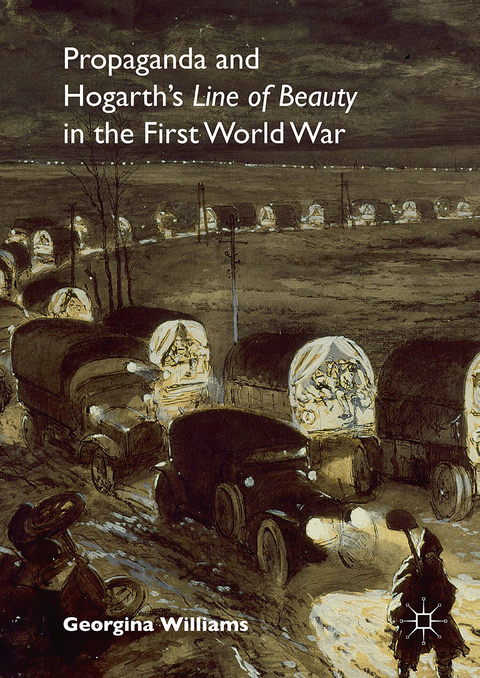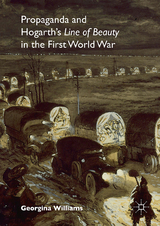Propaganda and Hogarth's Line of Beauty in the First World War
Seiten
2016
|
1st ed. 2016
Palgrave Macmillan (Verlag)
978-1-137-57193-9 (ISBN)
Palgrave Macmillan (Verlag)
978-1-137-57193-9 (ISBN)
Propaganda and Hogarth’s ‘Line of Beauty’ in the First World War assesses the literal and metaphoric connotations of movement in William Hogarth’s eighteenth-century theory of a ‘line of beauty’, and subsequently employs it as a mechanism by which the visual propaganda of this era can be innovatively explored.
Propaganda and Hogarth’s ‘Line of Beauty’ in the First World War assesses the literal and metaphoric
connotations of movement in William Hogarth’s eighteenth-century theory of a ‘line
of beauty’, and subsequently employs it as a mechanism by which the visual
propaganda of this era can be innovatively explored. Hogarth’s belief that
this line epitomises not only movement, but movement at its most beautiful,
creates conditions of possibility whereby the construct can be elevated from
traditional analyses and consequently utilised to examine movement in artworks
from both literal and metaphorical perspectives. Propagandist promotion of an alternate reality as a challenge
to a current ‘real’ lends itself to
these dual viewpoints; the early years of the twentieth century saw
growth in the advertising of conflict via the pictorial poster, instigating
intentionally or otherwise an aesthetic response from soldier-artists
embroiled on the battlefields. The ‘line of beauty’therefore serves as a
productive mechanism by which this era of propaganda art can be appraised.
Propaganda and Hogarth’s ‘Line of Beauty’ in the First World War assesses the literal and metaphoric
connotations of movement in William Hogarth’s eighteenth-century theory of a ‘line
of beauty’, and subsequently employs it as a mechanism by which the visual
propaganda of this era can be innovatively explored. Hogarth’s belief that
this line epitomises not only movement, but movement at its most beautiful,
creates conditions of possibility whereby the construct can be elevated from
traditional analyses and consequently utilised to examine movement in artworks
from both literal and metaphorical perspectives. Propagandist promotion of an alternate reality as a challenge
to a current ‘real’ lends itself to
these dual viewpoints; the early years of the twentieth century saw
growth in the advertising of conflict via the pictorial poster, instigating
intentionally or otherwise an aesthetic response from soldier-artists
embroiled on the battlefields. The ‘line of beauty’therefore serves as a
productive mechanism by which this era of propaganda art can be appraised.
Georgina Williams is a writer and artist. Georgina has exhibited paintings and photography, and is currently working on a continuing photographic project entitled Industrialia.
Introduction.- 1. The
Genealogy of the Line and the Role
of Resemblances.- 2. The
Poster as a Functional Object.- 3. The
Static Representation of Movement in Art and War.- 4. Representing
the Real in the Aesthetics of Conflict.- 5. Propaganda
and the Wider Visual Ecology of the Era.- Conclusion.
| Erscheinungsdatum | 08.10.2016 |
|---|---|
| Zusatzinfo | 6 Illustrations, color; 5 Illustrations, black and white; IX, 176 p. 11 illus., 6 illus. in color. |
| Verlagsort | Basingstoke |
| Sprache | englisch |
| Maße | 148 x 210 mm |
| Themenwelt | Geisteswissenschaften ► Geschichte ► Allgemeines / Lexika |
| Geschichte ► Allgemeine Geschichte ► Neuzeit (bis 1918) | |
| Geisteswissenschaften ► Geschichte ► Regional- / Ländergeschichte | |
| Geschichte ► Teilgebiete der Geschichte ► Militärgeschichte | |
| Schlagworte | Art History • history of conflict • Propaganda • William Hogarth • World War One |
| ISBN-10 | 1-137-57193-4 / 1137571934 |
| ISBN-13 | 978-1-137-57193-9 / 9781137571939 |
| Zustand | Neuware |
| Haben Sie eine Frage zum Produkt? |
Mehr entdecken
aus dem Bereich
aus dem Bereich
Europa 1848/49 und der Kampf für eine neue Welt
Buch | Hardcover (2023)
DVA (Verlag)
48,00 €
Giordano Bruno - ein ketzerisches Leben
Buch | Hardcover (2024)
C.H.Beck (Verlag)
29,90 €




